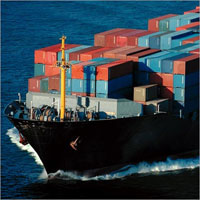 A press release by Congressman Elijah E. Cummings, Chairman of the House Subcommittee on Coast Guard and Maritime Transportation, strikes me as either sad, funny or perhaps a bit of both. The press release is titled: Cummings Continues Investigation Into American Commercial Fleet and is subtitled: Cummings eager to understand what can be done to expand the number of U.S.-flagged vessels carrying U.S. commercial cargo.” One is tempted to ask, why did it take you so long to notice?
A press release by Congressman Elijah E. Cummings, Chairman of the House Subcommittee on Coast Guard and Maritime Transportation, strikes me as either sad, funny or perhaps a bit of both. The press release is titled: Cummings Continues Investigation Into American Commercial Fleet and is subtitled: Cummings eager to understand what can be done to expand the number of U.S.-flagged vessels carrying U.S. commercial cargo.” One is tempted to ask, why did it take you so long to notice?
To be fair Congressman Cummings is not the first to be concerned about the disappearance of the US international merchant fleet, though at this point these concerns may be far too late. In a meaningful sense there is no real US flag merchant fleet in world trade.
All one needs to do is to look at the numbers. At the end of World War II the there were 2,480 vessels in the U.S. Merchant Fleet amounting to 16 million deadweight tons of shipping. In 1950, the US merchant fleet carried roughly 43 percent of the world’s shipping trade. Now it is less than 1%. As of the end of 2008, there were only 185 US flag oceangoing ships over 10,000 DWT. But even this is an overstatement. Ninety seven of these ships are only in the US domestic trades, protected against foreign competition by the Jones Act, leaving only 88 ships over 10,000 DWT in foreign trade. This too is deceptive as most of these ships are owned by foreign ship owners who receive multi-dollar subsidies to operate their ships under the US flag as part of the Maritime Administration’s Maritime Security Program. If these government protections and subsidies did not exist, it is highly possible that neither would the US merchant fleet.
How did it come to this? There are so many reasons including simple economics, wage rates, ill-advised subsidy programs, bureaucratic shipping companies, intransigent unions, and discriminatory tax policies, among other things. Just as the US has outsourced the manufacture of computer memory chips, to pick only one example, so too have we outsourced the overwhelming majority of our ocean shipping. Globalization is not necessarily bad or even new. Shipping, of all industries, is global. At the peak of US shipping in the nineteenth century, many foreign seaman shipped on US flag ships. Today, we are still relying on foreign sailors. Only the flags on the sterns of the ships are different.
We wish the congressman well with his hearings. We are not expecting much to be accomplished but we do wish his luck nevertheless.
